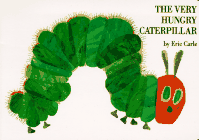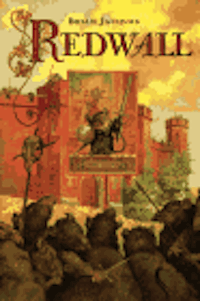Reading With Your Children at Home
The message is clear and, thank goodness, frequent: "Help your child become a more successful reader by reading to him OR her from the time your child is born." Research has shown that it works better than any reading drills, expensive pre-school programs or reading instruction to help a child learn to read. Besides that, it's cheap and it's fun for both parent and child. However, there's more. It's not enough to just read aloud for a few minutes, kiss the child goodnight and leave the room. You've got to stick around a while.

Barbara Kines, author of the wonderful parenting column in this magazine every month once asked her beginning second graders to write about a book that they would recommend for others. Two children wrote about the same book, The Very Hungry Caterpillar by Eric Carle, which is fortunate for us, because their writing tells us so much about themselves as well as about their book choice.
One child wrote,
"This is about a hungry caterpillar that ate a lot of stuff and turned into a butterfly. It is a nice story. I liked it."
That's not bad for a beginning second grader's writing. He certainly gets his point across, but listen to the second child:
"This is a story that I've heard all my life. Probably they read it to me when I was a tiny baby. And I still like it. So does my mom.
It's about a caterpillar that eats all kinds of food. Most of it is good for you, but it just gets more and more. I'd think he'd pop or at least have a stomach ache. Instead he turns into a butterfly and he has the colors of the food he ate in his wings.
My sister thinks that green leaf he ate on the last day made him change. I'm bigger and I know he was supposed to change. They all do.
It's sort of magic. My teacher says there's magic all around, like me turning from a baby to a kid.
Eric Carle's pictures are neat. They are mostly cut and paste -- collage -- and when he uses tissue you see through the top one to the others. He's written a huge pile of books. Very Quiet Cricket is special and ends with a surprise."
That's some kid! and that's some writing! I've never read or written a better book review, but let's look beyond the child's skill as a writer to look AT what's he's telling us. Not only has he been read to since he was a tiny baby, he's been talked to and listened to. Since both children had had the same early childhood teachers, this probably wasn't done for child number 2 at school. It must have happened at home. He has to have heard such discussions before and he has to have participated in them. He couldn't have done in writing what he hasn't done orally. He thinks that's what you're supposed to do with a book: think about it, extend it to personal experience, dig deeper into what it means. Who would have thought that Very Hungry Caterpillar had a theme? Yet, this very young child has been able to discover it and explain it to us.
Now, I can't guarantee that, if you and your child get to reading and talking about books, either one of you will be able to express yourselves that eloquently, but I can guarantee an increase in vocabulary, critical thinking and the art of conversation, and discussion You may even get some insight into your child's view of the world and his/her values. Not that it's easy. Don't expect your first book discussion to result in earth shaking insights on your part or on that of your child. Go slowly.
First, book selection matters. Every child loves the familiar and sometimes it's hard to get away from reading the same book every night or a television or movie rip-off. If that's a problem, extend the session. Read the child's old favorite and then bring out your choice. If you need help selecting appropriate books, get hold of Jim Trelease's wonderful and recently updated Reading Aloud and the Children's Book Reviews section of this site. Children's librarians are often very knowledgable about good books and about kids. It's important that you choose the right book for the right time for your child. Take small steps. If a preschooler's favorite is Goodnight Moon, try Frank Asch's Hello Moon. If your first grader is addicted to The Little Engine That Could, try Donald Crews' Freight Train.
It's important that you like the books you share with children. If a book is supposed to be funny, even if it's for a four year old, it should strike you, as a living breathing adult, funny. If it's supposed to be sad, you should have trouble getting through it without at least a lump in your throat. Let your child know what you feel.
When you've finished the book, or maybe before then, it's time for talk. If you say, "Did you like the book?" You may not get the discussion you hoped for. A yes or no question is apt to get a shrug or a one word answer -- end of discussion. Go slowly, don't launch into a treatise on the meaning of the book and on life in general, but saying something like, " I'm surprised at the way it ended. I thought he'd know it was just his echo" might be more likely to elicit a response from the child. Whatever you get, accept it. Be careful not to give the impression that there's only one meaning or logical opinion and it just happens to be yours. Sometimes a book will remind you of an experience or anecdote. Be sure to share it. Just as you're the best reader that child knows, you're also the best storyteller and everybody likes a good story, especially if it's true, or almost true.
You may think your job is finished once the child has learned to read, but it's just begun. Don't punish the child for learning to read by taking away something both of you enjoyed: reading aloud to your child. To be sure, when a child is mastering the art of reading, he/she needs plenty of opportunities to do so at home as well as at school, and you must listen, painful though it is, at times. But that's not instead of reading aloud, it's in addition to it. Good parenting is very time consuming. Some older children prefer to read to and by themselves and you must respect those wishes, but many children love being read to right through middle school or even adulthood. If they do elect to read alone, you're still not off the hook. Read the same book, another book by the same author, or a book on the same subject on your own. I've written several articles for this magazine on what I call "Parallel Reading" wherein parent and child read books at their own levels on the same topic and then talk about what they've discovered.

As children get older, you can get into more novels and the discussions can become quite heated. Fourth graders who love baseball might like Maniac Magee or Thank You, Jackie Robinson. There's ample fodder for discussion in either of those: racism, survivalist mentality and acts of random kindness, for starters. If you're reading to multi-ages, try books which can be understood on many levels like Redwall by Brian Jacques, the Narnia series by C. S. Lewis, The Moffat series by Eleanor Estes, or the Bagthorpe series by Helen Cresswell.
If your child is being read to at school, (and if not, find out why and pressure for it to start, because it's not a frill; it's a necessity), take some cues from that reading. If your child really likes the book in progress at school, try another one by that same author, or a similar kind of book. If the one the teacher has going is not to your child's taste, strike out in a new direction.
Once you get into the novels, give the author a chance by reading a couple of chapters before you decide you don't like it. Some of them take a while to warm up.
Once you've got a book that works, then start thinking, talking and even more important, listening. You've got the material and, yes, you've got the time. It's important!
![]()
Related Areas of Carol Hurst's Children's Literature Site
- Reading Aloud. Recommended Titles for Grades PreK-9.
- Raising Readers: Helping Your Child to Literacy
- Emergent Readers.
- Reading. Curriculum Area with Articles and Professional Books.
- The Very Quiet Cricket by Eric Carle. Teaching Guide with review, activities, related books and links.
- The Very Hungry Caterpillar by Eric Carle. Book Review with related links.
Advertisement:
Advertisement:
Advertisement:

